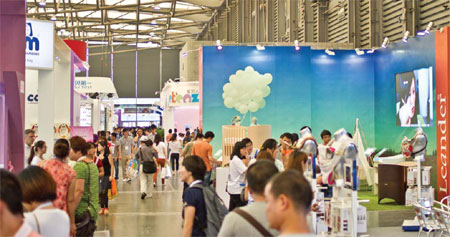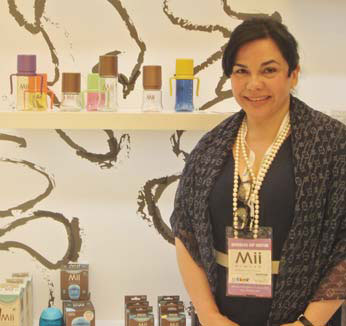Money to be made in land of the young
Updated: 2012-08-10 08:59
By Yao Jing (China Daily)
|
||||||||

|
Top: The Children-Baby-Maternity Industry Expo in Shanghai attracts a large number of overseas exhibitors. Provided to China Daily Above: Mii's founder Marlene Sirotae at the expo. Yao Jing / China Daily |
Related reading: Show catchcry: Viva Espana
It turns out that babyhood, childhood and its accoutrements are not simply child's play
There is probably little that Marlene Sirotae does not know about raising children, which is exactly what you would expect of a woman with six of her own. But Sirotae, a 47-year-old American, has one other credential up her sleeve: she claims to know a thing or two about what makes babies happy and healthy.
Sirotea was one of nearly 1,300 exhibitors - almost a third of them from overseas - in Shanghai for the annual Children-Baby-Maternity Industry Expo last month, and after a few minutes with her, it became clear that she was in China on a mission: to promote the idea of natural purity in products for babies and pregnant women.
That could be found, she reckoned, in the nurser bottles and "organic body skin care" products she is promoting for the company she founded, Mii.
The earnestness of Sirotea's message no doubt has something to do with the fact that, as she explained, she set up Mii in 2010 after a brush with cancer.
But underlying her company's interest in China and the success of the Shanghai expo are figures showing that the business of caring for the young is far from kid's play.
The US consulting company Frost & Sullivan reckons the total market value of China's children's, baby's and maternity market was worth 240 billion yuan ($38 billion, 31 billion euros) in 2010, a 50 percent increase over three years, and it predicts annual growth of 15 percent, making the market worth more than 500 billion yuan by 2015.
To put those sums into perspective, China's National Bureau of Statistics reckons that nearly 30 percent of what families in cities spend goes on infants or children - that in a country where 222 million of its population are under 15.
No wonder then that Mii had plenty of companies in trying to sell her message and her wares in a show that drew a record attendance of nearly 102,000, and at which about 2,000 products were on display on 116,000 square meters of floor space, half as big again as last year. The products included toys, clothing, shoes, furniture, food and health-care items.
"Chinese mothers are exceptionally in tune with the health and well-being of their children as the illness rate is growing around the world," said Sirotae, who set up her US-based company in 2010 and began trading a year ago.
In that time, the company has had phenomenal success, with a turnover of $50 million and selling in 18 countries. Now it is China's turn.
Ma Ying, managing director of UBM China of Hangzhou, which organized the Shanghai expo, said: "More overseas brands are here this year. I think they are more sophisticated in product segmentation, and also very experienced in making dedicated products that are in accordance with customers' needs."
While there are hundreds of baby-care producers in China, overshadowing them are two market giants, Goodbaby Group and China Yeehoo Group Ltd.
Most of the local makers are original equipment manufacturers at a lower level which are now trying to produce their own brands.
Foreign brands such as Gucci Kids, Burberry Children, Baby Dior and Armani Junior have made inroads into the Chinese market in recent years, and now other upmarket brands from Western countries are trying to join them.
"The market will be further subdivided, and some small-scale local companies will be forced out with the arrival of more mature brands and companies," Ma said.
Several years ago, foreign brands were rushing into the Chinese market unprepared, but now they are finding partners familiar with the market first, adjusting products to fit Chinese customers' tastes and likes, she said.
Sirotea said that her health problems had made her realize that not putting toxins into the body is better than fixing the resulting problems later.
Her products will be first sold in China in a baby-care store in Solana Lifestyle Shopping Park in Beijing in October, as the result of a sole-agent agreement covering all of China with Cosmo Beebies, a premium baby product retailer run by B&Y Investment (Asia) Co Ltd of Hong Kong.
Liu Yuehua, the brand manager of Cosmo Beebies, which has been working with Sirotae's Mii brand since it was launched in the US, said: "The brand performs well in Hong Kong. The retail value is about $50,000 every month in our flagship store, and we are distributing to another six retailers."
Liu said the organic products are made in the United States with the certification of the US Department of Agriculture, so are relatively easy to bring into China.
However, the Hong Kong market is small and has little space for growth and Mii sees much more potential in the mainland market.
"We won't just have our own shops, but want to work with distributors to expand the sales channel," Liu said.
The products Cosmo Beebies sells are at the high end of the market, and it wants to maintain that position, Liu said. One concern is copycats, and extra care needs to be taken when signing up buyers, she said.
But for Alex Lau, director of Arketype Ltd, the main challenges are different. Promotion and localization are his focal points as he brings a new brand to the market.
His company, set up in Hong Kong in 2005, is in the home decor market, and has been the sole trader for Leander, a Danish children's furniture brand, since 2008.
"We are now sold in 12 stores on the Chinese mainland, including baby-care chain stores such as Lollopop and Baby International, compared with five stores last year," Lau said.
The Leander bed, which can be adapted as a child grows, from babyhood to early childhood, is priced at 13,900 yuan. The company says it has sold 300 beds, and it has opened an office in Shanghai to spearhead expansion.
The Danish royal family is said to own the premium version of the bed. A plus for those selling the bed in China is that it is regarded as difficult to copy, but against that is the difficult task of convincing people that it can be fun putting a bed together.
Lau said the company is trying to provide better after-sales service to add value to the brand, and is trying to educate people that it is fun to take 45 minutes to build a bed that can mark a child's milestones.
On the first day of the Shanghai expo he was surprised that a retailer with four stores in the Inner Mongolia autonomous region came to his booth and showed great interest in buying his products, he said.
"I realized that the Chinese market is so big that even consumers in smaller cities are becoming an increasingly important market."
Another expo attendee, Gavan Costello, founder of the 30-year-old Irish company Baby Elegance, set up a China office six months ago.
"We've been coming and doing partnerships in China for 20 years," he said. "More than 25 factories in China manufacture 60 percent of our total products."
His long experience with China has taught him that its people are very keen on European brands, he said. When he came to the expo last year and saw how busy it was, he decided to attend this year.
Despite Europe's economic woes, he said, the company's turnover had risen 40 percent this year compared with the corresponding period last year. Total income last year was 5 million euros, he said.
He attributed this year's good figures to the company's making adjustments that were appropriate to the time and the market.
"In the first 20 years we just sold in Ireland and the United Kingdom, and then we slowly moved into other markets within Europe. We are also opening our own retail stores."
China is the first country the company has operated in outside of Europe. Though more and more foreign brands are coming to China, he said he is confident the market is big enough to accommodate them.
"In China we hope to do at least 1 million euros in the first year. If China works well, we will go to Australia and other countries."
Costello said he hopes sales in China will account for half the company's total revenue within five years.
yaojing@chinadaily.com.cn
(China Daily 08/10/2012 page10)

 Relief reaches isolated village
Relief reaches isolated village
 Rainfall poses new threats to quake-hit region
Rainfall poses new threats to quake-hit region
 Funerals begin for Boston bombing victims
Funerals begin for Boston bombing victims
 Quake takeaway from China's Air Force
Quake takeaway from China's Air Force
 Obama celebrates young inventors at science fair
Obama celebrates young inventors at science fair
 Earth Day marked around the world
Earth Day marked around the world
 Volunteer team helping students find sense of normalcy
Volunteer team helping students find sense of normalcy
 Ethnic groups quick to join rescue efforts
Ethnic groups quick to join rescue efforts
Most Viewed
Editor's Picks

|

|

|

|

|

|
Today's Top News
Chinese fleet drives out Japan's boats from Diaoyu
Health new priority for quake zone
Inspired by Guan, more Chinese pick up golf
Russia criticizes US reports on human rights
China, ROK criticize visits to shrine
Sino-US shared interests emphasized
China 'aims to share its dream with world'
Chinese president appoints 5 new ambassadors
US Weekly

|

|







